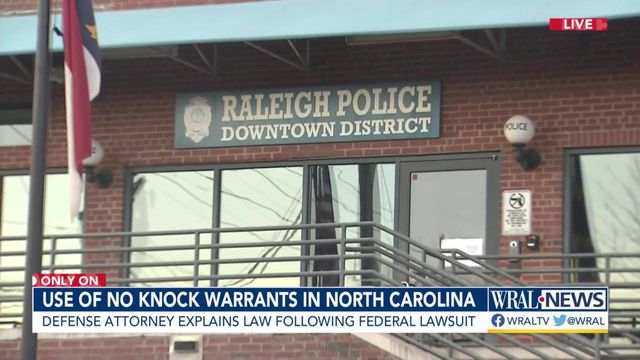RPD says they don't use no-knock warrants amid criticism from civil rights groups
Amid growing criticism from local civil rights group over the Raleigh Police Department's use of no-knock and "quick-knock" warrants, Police Chief Stella Patterson said that the department does not use the warrants.
Posted — Updated“As far as I am concerned and where I stand, that will be the position of this organization, that we do not seek or utilize no-knock warrants," she told WRAL News in an interview on Tuesday.
Despite Patterson's claims, a federal civil rights lawsuit alleges officers carried out two no-knock warrants in May 2020 on Burgundy Street in Raleigh while investigating a drug case. Patterson was not chief of police at the time of the alleged incident.
Raleigh police have refused multiple requests for information about the May 2020 raid citing “pending litigation” but a spokesperson said the department’s policy prohibiting no-knock raids was in effect prior to the incident.
North Carolina law gives officers discretion in serving quick-knock warrants and says officers can force their way into someone's home if "they believe admittance is being denied or unreasonably delayed."
"[The law] just states you knock and announce your presence," Patterson said. "I have always been taught that you clearly knock on the door, and then you clearly announce, and then you enter at that time."
Patterson emphasized that no-knock warrants are dangerous for officers because they "don't know who or what is on the other side of that door. There could be individuals lying in wait. You never know."
“It is very clear that we won't serve no-knock warrants. Officers must knock and announce when executing a warrant," she added.
Daniel Meier, a criminal defense attorney with Meier Law Group, said local police agencies make their own policies surrounding no-knock warrants.
“The guidelines on no-knock warrants, which are the big issue, are pretty slim," Meier said.
There is debate over how long officers should give someone before breaking down the door, Meier said, and the amount of time necessary for someone to come to the door is "in the eye of the beholder and in the eyes of the court."
“They do have to give notice, but it’s not like they have to knock on your door and yell and wait five minutes for you to open up," he said. "Depending on the circumstances, that notice can be awfully short.”
Patterson said that she believes it is reasonable for officers to knock, announce and make it clear they are at the door. But that doesn't mean officers are required to make sure that the person on the other side of the door has time to "get up, put their clothes on and come to the door."
• Credits
Copyright 2024 by Capitol Broadcasting Company. All rights reserved. This material may not be published, broadcast, rewritten or redistributed.






